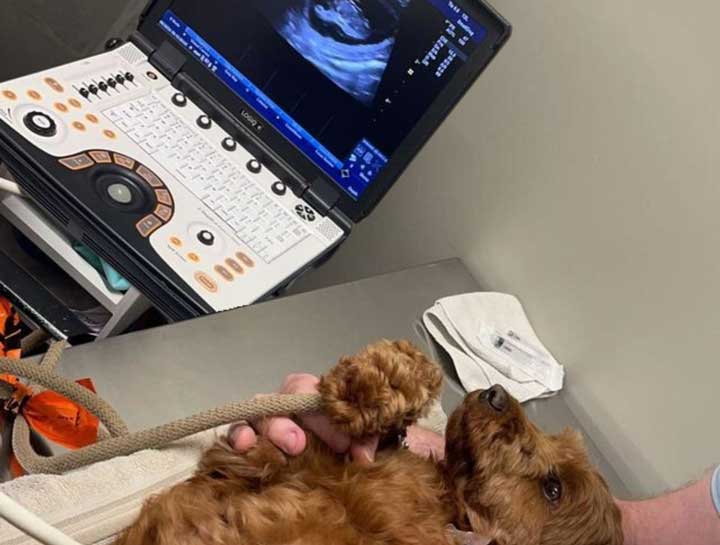Pet Ultrasound
A non-invasive way to diagnose sick & injured pets.
We offer veterinary ultrasounds for pets. Much like ultrasound for people, pet ultrasound is a safe, non-invasive imaging technique used to diagnose sick and injured animals.
How does ultrasound work?
When the sound waves penetrate the body, they “bounce” back. The ultrasound machine measures the time it takes for a sound wave to bounce back and creates an image.
What conditions can be diagnosed by ultrasound?
Some injuries and conditions that can be identified via ultrasound include:
- Bladder and kidney stones
- Gastrointestinal obstructions
- Pregnancy
- Cysts and tumors
- Heart conditions
Ultrasound also allows us to safely collect biopsy and fluid samples without having to perform invasive surgeries.
Why Does My Pet Need an Ultrasound?
Just like our other diagnostic tools, such as X-rays and blood panels, ultrasound gives us a valuable piece of the puzzle when investigating your pet's illness. It can provide vital information in an emergency as well. We can quickly scan for signs of fluid in the abdomen, such as blood. If abdominal distension is present, we can quickly look for obvious signs of organ enlargement. For example, the uterus is a common organ that can become enlarged with a life-threatening condition called pyometra.
One of our doctors may recommend an abdominal ultrasound because your pet is unwell and something abnormal is detected on a physical exam, visualized on abdominal/chest x-rays, or blood work. Our doctors are responsible for performing cardiac and abdominal ultrasounds and have undergone extensive ultrasound training offered through the Sound Academy of Veterinary Imaging, MiEducation, and Heska. You will likely be asked to fast your pet in preparation for an ultrasound.
For abdominal ultrasounds, this is extremely important because food in the stomach and intestines will interfere with a thorough study and acquisition of images. A typical abdominal ultrasound takes approximately 1 hour, during which time your pet will be lying on their back in a comfortable supportive bed. A short-acting sedation will be given so your pet can be relaxed and minimize movement. Hair on the belly is shaved to prevent interference with the ultrasound images. A complete abdominal ultrasound study will assess all organs in the abdomen and look for any changes to their structure. Unfortunately, many disease processes can have similar changes on ultrasound. There may be abnormalities identified that increase our suspicion of a specific disease or illness, but we rely on the patient's complete medical picture to guide our treatment. Many conditions require an examination of the cells themselves either with fine needle aspiration or biopsy to diagnose.
For a cardiac ultrasound, your pet will also be fasted the night prior. A mild sedative may be required for relaxation and proper positioning on the cardiac table. The cardiac table is a specialized padded table with windows allowing access to the chest while your pet is lying on their sides. A patch of hair will be shaved on either side of the chest to generate a complete image of the heart and evaluate for heart conditions. Cardiac ultrasound studies will be used to guide treatment and monitoring, as well as assess anesthetic safety and medication selection. A cardiac ultrasound may be recommended by one of our doctors due to the presence of a new or the progression of an existing heart murmur heard on examination.
All ultrasound images are reviewed by a board-certified radiologist or cardiologist respectively to ensure that subtle changes are not missed and provide valuable expert recommendations on case management. Serial ultrasounds can be used to monitor the progression of disease and/or response to treatment.
If your pet is showing signs of illness or injury, call us at (519) 929-9308 to schedule an appointment. An ultrasound may be able to assist in diagnosing the problem.

